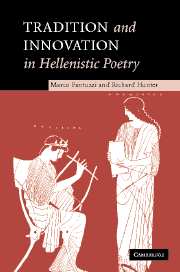Book contents
- Frontmatter
- Contents
- Preface
- List of abbreviations
- 1 Performance and genre
- 2 The aetiology of Callimachus' Aitia
- 3 The Argonautica of Apollonius and epic tradition
- 4 Theocritus and the bucolic genre
- 5 Epic in a minor key
- 6 The style of Hellenistic epic
- 7 The epigram
- 8 The languages of praise
- 9 Hellenistic drama
- 10 Roman epilogue
- Bibliography
- Index of passages discussed
- General index
8 - The languages of praise
Published online by Cambridge University Press: 22 September 2009
- Frontmatter
- Contents
- Preface
- List of abbreviations
- 1 Performance and genre
- 2 The aetiology of Callimachus' Aitia
- 3 The Argonautica of Apollonius and epic tradition
- 4 Theocritus and the bucolic genre
- 5 Epic in a minor key
- 6 The style of Hellenistic epic
- 7 The epigram
- 8 The languages of praise
- 9 Hellenistic drama
- 10 Roman epilogue
- Bibliography
- Index of passages discussed
- General index
Summary
CALLIMACHUS' HYMNS AND THE HYMNIC TRADITION
Four hymns to Isis of the early first century bc by one Isidorus were inscribed on the temple of Isis-Hermouthis at Medinet Madi in the southern Fayum; two are in hexameters, and two in elegiac couplets. The content of the poems suggests a mixture of Greek and Egyptian religious conceptions, expressed in Greek hymnic forms and a language which, on the one hand, ‘harks back to the Greek epic-poetic tradition’ – Homeric words and echoes are frequent – and, on the other, has many elements in common with the surviving Isiac ‘aretalogies’ (i.e. descriptions of the goddess' powers and benefactions) of the late Hellenistic and Roman periods. The promise of 1.25, δεσπότι, οὐ λήξω μεγάλην δύναμίν σου ἀείδων, ‘Lady, I shall not cease from singing of your great power’, is of a kind familiar to any reader of the Homeric Hymns, and the first three poems end with traditional requests to the goddess for health, happiness, and prosperity (cf. e.g. Callimachus, Hymn to Zeus 96–7, Posidippus 101 AB etc). The first part of the third hymn concentrates upon Isis' rôle, equivalent to that of the Greek Demeter with whom she is identified in v. 2 (cf. 1.3, 22), as giver of (particularly agricultural) wealth:
ὑψίστων μεδέουσα θεῶν, ῾Ερμοῦθι ἄνασσα,
῏Ισι ἁγνή, ἁγία, μεγάλη, μεγαλώνυμε Δηοῖ,
σεμνοτάτη δώτειρ᾿ ἀγαθῶν μερόπεσσι ἅπασι
εὐσεβέσιν μεγάλας χάριτας καὶ πλοῦτον ἔδωκας,
καὶ ζωὴν γλυκερήν τε ἔχειν καὶ τέρψιν ἀρίστην
ὄλβον, εὐτυχίην καὶ σωφροσύνην τε ἄλυπον.
ὅσσοι δὲ ζώουσι μακάρτατοι, ἄνδρες ἄριστοι,
σκαπτροφόροι βασιλεῖς τε καὶ ὅσσοι κοίρανοί εἰσι,
οὗτοι σοι ἐπέχοντες ἀνάσσουσ᾿ ἄχρι τε γήρως,
λαμπρὸν καὶ λιπαρὸν καταλείποντες πολὺν ὄ[λβον 10
υἱάσι θ᾿ υἱωνοῖσι καὶ ἀνδράσι τοῖσι μεταῦτις.
ὃν δὲ κε φίλτατον ἔσχε ἀνάκτων ἡ βασίλεια
καὶ Ἀσίας τε καὶ Εὐρώπης τε ἀνάσσει,
εἰρήνην τε ἄγων, καρποὶ βρίθουσιν ἐπ᾿ αὐτῷ
παντοίων ἀγαθῶν, καρπόν τε φέροντες ἄριστον. 15
ὅππου δὴ πόλεμοί τε ἀνδροκτασίαι τε μάλιστα
μυριάδων ὄχλων τε τὸ σὸν σθένος, ἡ δύνα[μίς σου,
πλῆθος ἀπημαύρωσ᾿, ὀλίγοισι δὲ θάρσος ἔ[δωκε.
Ruler of the highest gods, Queen Hermouthis, Isis, pure, holy, great, great-named Deo, most reverend giver of good things to all mortals, to the pious you give great favours and wealth, a sweet life, the best form of happiness, prosperity, good fortune, and a wisdom which is free from pain. Those whose lives are most blessed, the best of men, sceptre-bearing kings and men of power, all these rule until old age, if they heed you, and they leave behind prosperity, gleaming and rich in great quantity, to their sons and their grandsons and to those who come after. He whom the Queen holds most dear of rulers rules over Asia and Europe; he brings peace, under him the crops are heavy with good things of every kind and bear marvellous harvest. Where there are wars and countless slaughter, your strength, your power wipes out the countless enemy throng and gives courage to the few.
(Isidorus 3.1–18)- Type
- Chapter
- Information
- Tradition and Innovation in Hellenistic Poetry , pp. 350 - 403Publisher: Cambridge University PressPrint publication year: 2005



